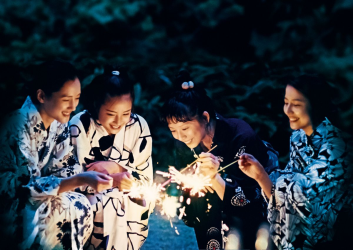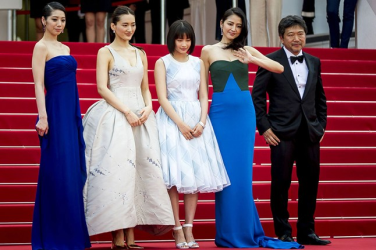Watching a foreign movie is a bit like watching a very old movie—no, not like Star Wars, you whippersnappers!—say, from the ’30s or earlier. Society, attitudes, outlooks have changed so much, that you have to put yourself in a different mindset in order to get what’s going on, sometimes in surprising ways. Years ago, while watching Le nom de gens, for example, I had to adjust my attitude to embrace French provincialism, because otherwise the whole tension created by a couple of white people (when one is a French Jew and the other half-Algerian) in 2006 getting married. Or, a little closer to the topic at hand, in Only Yesterday, when the girl steps out of the house without her shoes and her father hits her—in what is essentially a sweet film!—you have to be able to assume the point-of-view where that action is understandable, or you can’t make it past that point.

For example, I still don’t know why they ate these sparklers.
Our Little Sister is the story of the three Koda sisters living together as adults in the house where they grew up. Their father ran off with another woman when they were children, and their mother ran off rather than deal with raising them. They’re all somewhat dysfunctional in their own way, except perhaps the youngest, who is odd, with odd taste in men, but seems to otherwise be in pretty good shape. The middle one pursues a series of poor relationships with awful men. The oldest acts as a surrogate mother, even though they’re all grown, and has a relationship with a married man.
The catalyst for the action is the death of their father. They decide, somewhat haphazardly, to attend the funeral. Dad has, since leaving, moved on to wife number three—he may have been widowed by #2, if I recall correctly—and bringing in tow the child from that relationship. This girl, Suzu, 13, is now relegated to life with her stepmother who doesn’t seem particularly interested in her, and in an apparently spontaneous act of kindness, Sachi (29) invites Suzu to come live with the three girls in the house.

You might as well just send engraved invitations to ALL the tentacle monsters.
This is somehow scandalous, apparently because Suzu is the product of the infidelity that broke up the Koda family. I get this, I suppose, but I feel like the watchword in America was put forth by Dan Hedaya in Clueless all the way back in 1995: “You divorce wives, not children.” But it’s important to get into the Japanese mindset, or you’ll miss that Sachi just might have another motive for bringing Suzu to live with them, a motive that even she doesn’t consciously grasp.
The first act is particularly fun, with the girls’ various dysfunctions being the sort of thing you might see in a wacky comedy, really. In the second act, though, you get a new perspective on those things. They’re not wacky, they are true dysfunctions. (And, in fairness, some of the dysfunction you see turns out maybe not to be.) In the third act, you end up seeing the characters as whole persons, hindered but not defined by their dysfunction. As such, this is a very satisfying film.
It’s also beautifully shot.

Of course.
It is, of course, very Japanese. Much like Studio Ghibli films (and it felt like a live action Ghibli film in some ways), there isn’t some huge conflict with an Evil Force to be vanquished. There is, for example, a very dramatic third act break up which goes something like:
“We have to break up.”
“Darn, I was worried you were going to say that.” [walks away]
It is subtle, pretty much all around. One of the peripheral characters is dying of cancer, and as she’s saying goodbye to one of the girls who, we can tell, has been like a daughter to her, she ventures to dare a slight touch on the girl’s shoulder as she walks out the door.
The Japanese are not a huggy people, apparently.
The Boy and went out of our way to see this, having really enjoyed writer/director Hirokazu Koreeda’s last film, Like Father, Like Son, which was also a subtle affair about a highly emotionally charged subject. This may not have been quite to that level, but it was very, very good and we were pleased to have seen it.
Excellent traditional (Western) score by Yoko Kanno.

Aw, aren’t they pretty? And demure (at least by our premiere/award standards)!

One thought on “Our Little Sister”